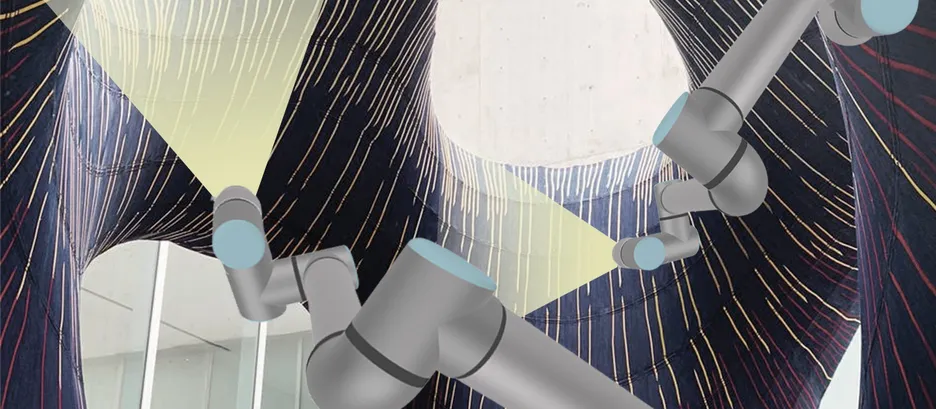Computational Design and Fabrication
The seminar "Computational Design and Digital Fabrication" will take place within the framework of the Collaborative Research Center "Additive Manufacturing in Construction" (AMC) as a cross-university seminar in cooperation with research groups associated with the center. The course aims to bridge fundamental principles of geometric computation and design and use these insights to develop new algorithms and tools for 3D shape generation, simulation, structural design, and manufacturing in design and engineering. At the interface of various scientific disciplines such as mathematics, computer science, civil engineering, architecture, and digital fabrication, students are taught innovative computational design solutions for advanced manufacturing and construction at various scales.
The aim of the course in the summer semester of 2022 is to explore the formal and constructive potential of knitted formwork, researched by Prof. Dr. Mariana Popescu, TU Delft, in combination with robotic 3D printing technology for concrete construction, researched within the AMC. In this context, the seminar deals with the digital form-finding of flat membrane structures, the digitally controlled knitting, and the subsequent robot-supported concreting by Shotcrete 3D Printing for a light textile-reinforced pedestrian bridge. At the end of the seminar, full-scale production of a prototype of this bridge is planned in the Digital Building Fabrication Laboratory of the TU Braunschweig.
Course Structure:
The seminar is divided into three parts, each led and conducted by one of the participating universities:
Part 1 - Computational Form Finding (TU Munich, online)
Part 1 teaches digital form-finding techniques in three separate sessions, integrating the digital fabrication methods of knitting with robotic 3D printing technology as part of the shape generation for a pedestrian bridge. In the beginning, the basics of computational geometry and theoretical aspects of computational design and digital manufacturing are taught. A computational design tool is presented and demonstrated using exercises. This design tool is used by the students to customize and complete the task of designing an overarching structure. At the end, all design projects are presented and discussed.
Part 2 - Small-scale Prototyping (TU Delft, on-site)
Part 2 is taught as part of an excursion to TU Delft aimed at prototyping selected designs using a digital knitting machine at the Professorship of Parametric Structural Design and Digital Fabrication. Methods of robotic path planning and control will be taught through the selective painting of the knitted fabric with a collaborative robotic arm.
Part 3 - Upscaling and demonstrator fabrication (TU Braunschweig, on-site)
Part 3 aims to upscale a selected design and fabricate a 1:1 scale demonstrator of the pedestrian bridge in the Digital Building Fabrication Laboratory of TU Braunschweig. This part is also taught as part of an excursion at the end of the seminar.
Teaching Team:
- TU Munich: Chair of Structural Analysis (Prof. Dr.-Ing. K.-U. Bletzinger, Dr.-Ing. M. Hojjat), Professorship of Structural Design (Prof. Dr. Pierluigi D’Acunto), Professorship of Digital Fabrication (Prof. Dr. Kathrin Dörfler)
- TU Braunschweig: Institute of Structural Analysis (Prof. Dr.-Ing. Roland Wüchner), Professorship for Digital Building Fabrication (Prof. Dr. Norman Hack)
- TU Delft: Professorship of Parametric Structural Design and Digital Fabrication (Prof. Dr. Mariana Popescu)
